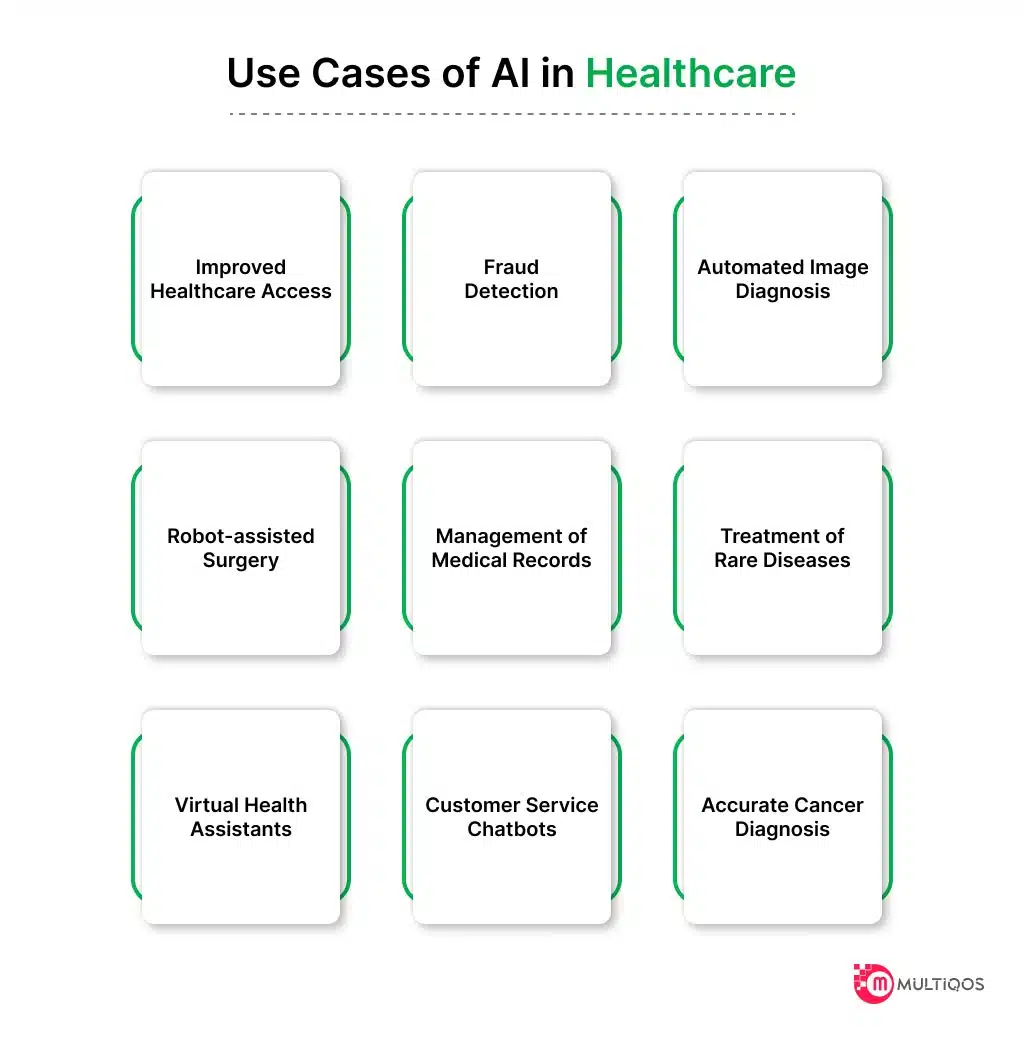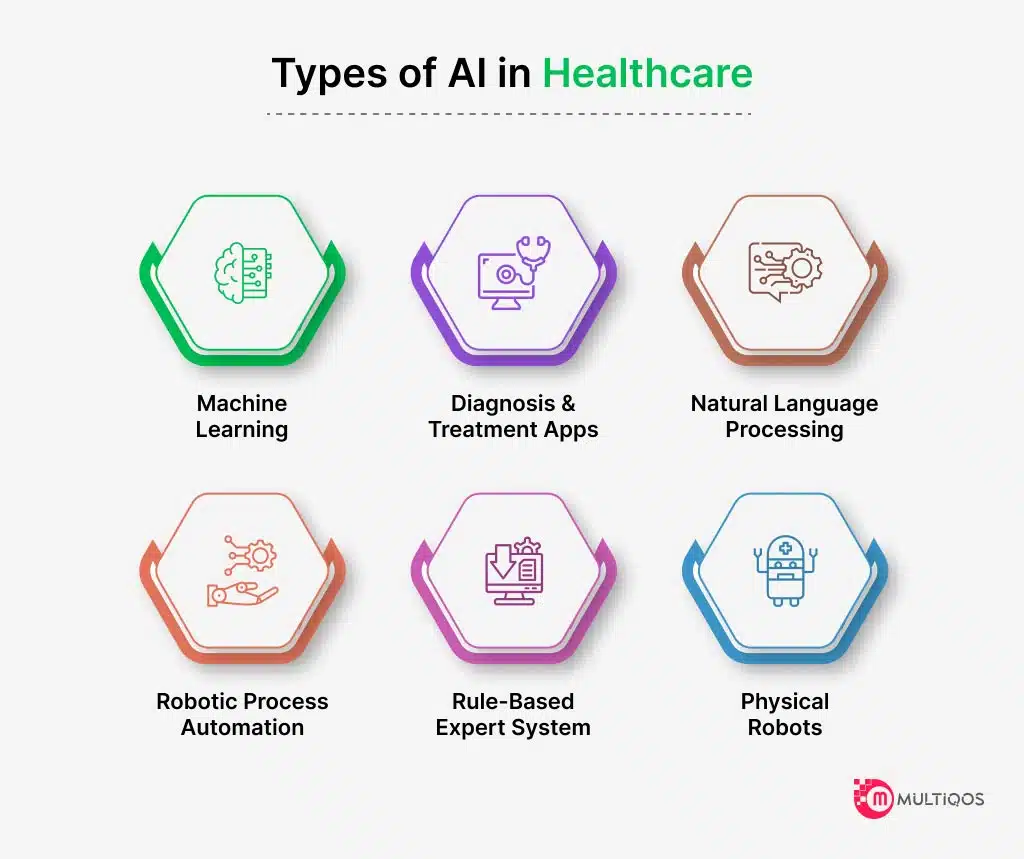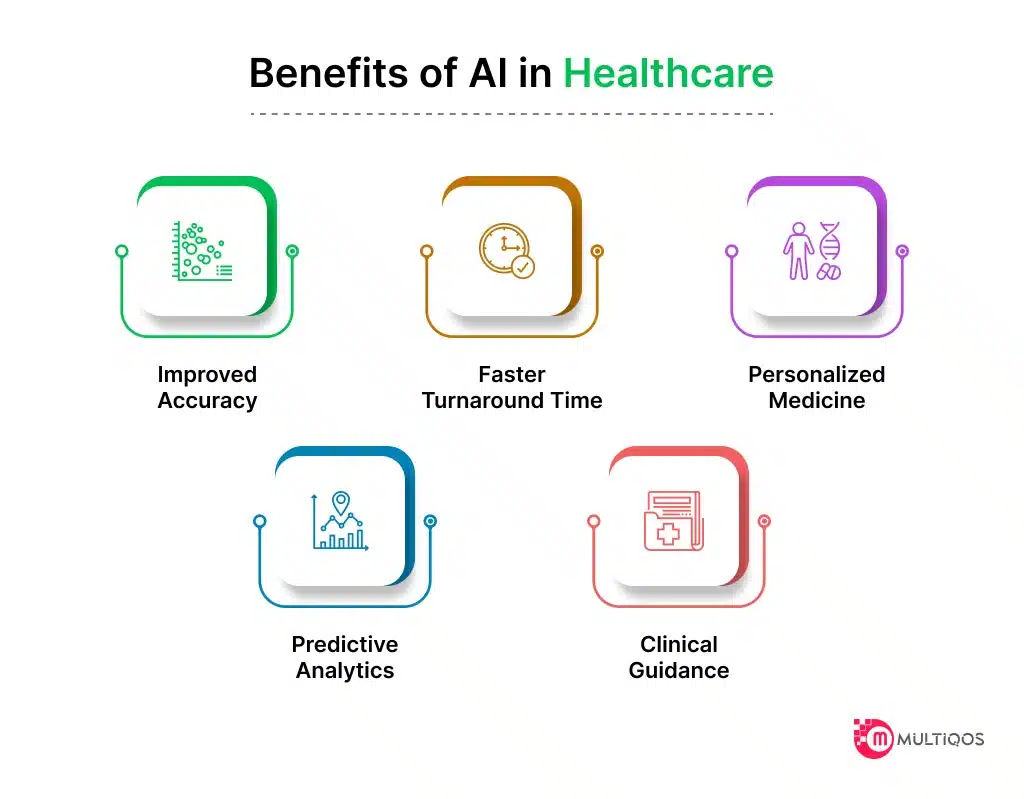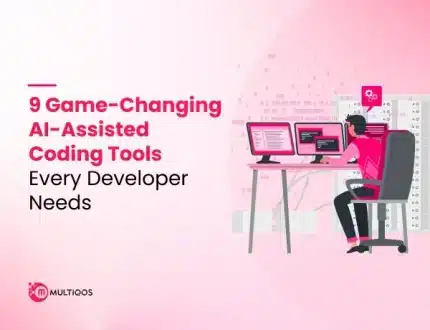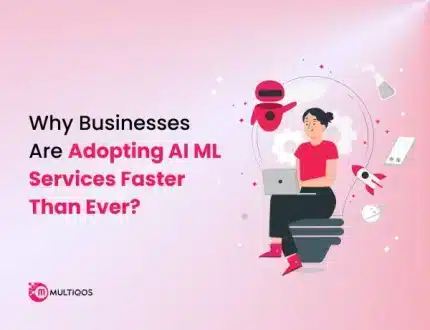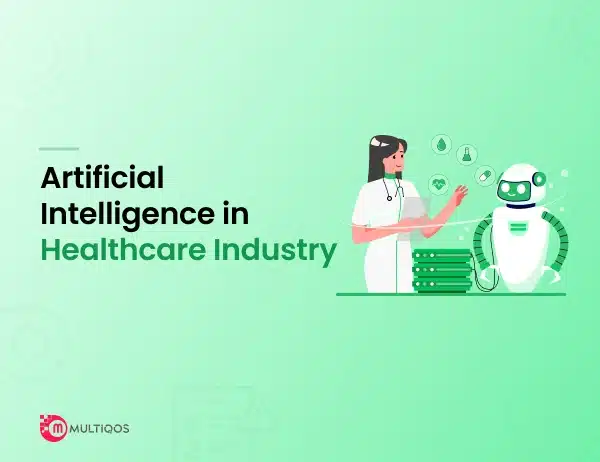
AI & ML are groundbreaking technologies that are transforming various industries. With their substantial impact on the healthcare industry these technologies contribute a significant 11% to the global GDP, i.e $9 trillion annually in amount. These cutting-edge technologies are essential to many parts of the healthcare value chain, from developing new drugs and vaccines to improving medical diagnosis and treatment. They are raising standards and improving efficiency throughout the whole healthcare system.
Artificial Intelligence, as a dynamic and disruptive force in computer science, possesses the potential to profoundly revolutionize medical practices and healthcare delivery. This comprehensive review delves into recent breakthroughs where AI is making substantial strides in the healthcare landscape. It outlines a strategic roadmap for constructing AI systems that are not only effective but also reliable and safe.
Moreover, the article explores the potential future trajectories of healthcare systems that are augmented by the capabilities of AI. Embrace the forefront of technological advancements in healthcare—this review unfolds the transformative journey of AI within the medical realm, promising a future of enhanced efficiency and innovation.
5 Predictions for AI in Healthcare in 2024
Prediction #1: Generative AI Revolutionizing Healthcare Efficiency
Healthcare is about to change as a result of generative AI’s ability to improve patient interaction, automate processes, and streamline procedures. This technology improves the quality of services and patient satisfaction by relieving administrative loads and coordination issues, freeing up healthcare personnel to concentrate more on direct patient care.
Prediction #2: AI Streamlining Payer Operations in Healthcare
As we approach an election year, the pivotal role of AI in healthcare payer organizations becomes evident. Emphasizing benefit processing, AI minimizes friction, improving claims experiences and transparency. With Medicare Advantage exceeding 50% coverage, AI enhances member experiences and drives efficiency in healthcare systems.
Prediction #3: AI Copilots Addressing Healthcare Workforce Shortages
In 2024, AI copilots emerge as a solution to persistent healthcare staffing shortages. Empowering healthcare workers, these assistants provide data-driven insights for improved in-home care. Automating patient reminders, transportation coordination, and health issue detection, AI copilots signify a new era of efficient and accessible healthcare, bridging workforce gaps through democratized tools.
Prediction #4: Demanding AI Transparency in Healthcare
As AI’s influence grows in healthcare, vendors face increasing pressure to ensure AI model auditability due to rising regulations. Healthcare organizations prioritize understanding AI operations to ensure accurate decision-making, protect patient data, and maintain transparency and accountability, building trust in AI-driven solutions.
Prediction #5: Compliance-Driven Innovation in Healthcare
In the upcoming year, healthcare organizations will strategically allocate tech budgets, focusing on compliance initiatives for mandates like prior authorization/denials and value-based care. Balancing compliance, innovation, and budget constraints, this approach enhances operational efficiency without disrupting staff or causing consumer dissatisfaction. These forecasts focus on how AI will play a critical role in revolutionising healthcare, emphasising efficiency, transparency, and patient-centered delivery.
Also Read: Top Healthcare App Ideas for Startups in 2024 & Beyond
The Role of AI in Healthcare Industry
-
How AI May Enhance the Experience for Both Employees and Patients
Elevating patient satisfaction stands as a paramount goal for healthcare organizations. With the integration of machine learning and AI, patient data transforms into a valuable resource, providing crucial insights to enhance and optimize the overall patient journey. Machine learning systems not only improve health outcomes but also boost patient satisfaction, linked to greater compliance and treatment adherence.
AI enables more personalized and convenient healthcare experiences, with chatbots contributing to increased satisfaction. A Pegasystems survey in 2019 found that 42% of patients are comfortable with AI in healthcare decisions. For healthcare workers, AI alleviates manual tasks, reducing burnout by freeing up time otherwise spent on routine administrative duties, which can account for up to 70% of a healthcare practitioner’s time.
-
The Use of AI Is Transforming How Care is Delivered
Refining AI for clinical surveillance empowers hospitals to swiftly and accurately identify various health conditions, potentially saving lives and cutting costs. By scrutinizing extensive datasets, AI forecasts patients susceptible to infections, facilitating prompt treatment responses and thwarting potential hospital transmission.
By 2030, AI might be able to forecast a person’s risk of developing chronic illnesses, according to the WHO.In order to successfully manage illnesses like diabetes, congestive heart failure, and COPD, it might suggest preventative actions.
-
AI-driven Drug Discovery
AI accelerates drug discovery, enhancing speed and cost-effectiveness. AI plays a pivotal role by swiftly analyzing extensive datasets from patients with and without diseases, pinpointing potential compounds that target specific proteins.
One noteworthy accomplishment was AlphaFold, a DeepMind AI developed by Google that opened up new avenues for creative structure-based medication creation by making significant progress in understanding protein folding.
-
Harnessing AI for Patient Risk Identification
In healthcare, predictive analytics utilizes vast historical and real-time data to generate valuable forecasts and recommendations, ranging from individual patient care to broader public health. Assessing tens of thousands of data points enables predictions on individual health risks and the likelihood of hospital readmission with infections. This proactive approach empowers healthcare professionals to optimize treatment plans, potentially mitigating the necessity for costly and time-intensive medical interventions.
-
AI-powered Radiology Transformation
AI systems are revolutionizing medical diagnostics, rapidly classifying brain tumors in just three minutes and aiding in computer-aided cancer detection. This technology extends to identifying hidden fractures, detecting breast cancer, and recognizing neurological abnormalities. Beyond diagnosis, AI alleviates the burden on radiologists by handling repetitive tasks, allowing clinicians more time for tasks requiring human interpretation.
Types of AI of Relevance to Healthcare
AI in healthcare encompasses a diverse array of technologies, each tailored to specific purposes. Despite the industry’s substantial gains from these various AI technologies, their applications may differ across tasks and processes. Let’s delve into some of the most impactful AI technologies in healthcare:
-
Machine Learning
Machine Learning (ML) is a prevalent form of AI in healthcare, leveraging data and algorithms to mimic human learning and enhance accuracy. A standout application is precision medicine, predicting optimal treatment procedures based on diverse patient attributes. This often involves supervised learning with known outcomes. Deep learning, the most intricate ML form, employs neural network models for predicting outcomes, as seen in identifying potentially cancerous lesions in radiology images.
-
Diagnosis and Treatment Applications
Diagnosis and Treatment Applications leverage AI to enhance healthcare. AI analyzes patient data, medical images, and clinical guidelines for accurate disease diagnosis and treatment planning. In medical imaging, AI excels, offering precise evaluations for early detection.
-
Natural Language Processing (NLP)
For creating and categorizing research and clinical documents we can use NLP in the healthcare industry. It efficiently analyzes unstructured clinical notes, offering valuable insights to enhance methods, ensure quality, and improve patient care.
-
Robotic Process Automation
Healthcare RPA employs automation to learn and mimic rules-based business processes.It is notable for being honest, affordable, and easy to use. RPA is very good at automating repetitive operations in the healthcare industry, such as invoicing and patient record updates.
-
Rule-Based Expert System
AI’s impact in healthcare extends to rules-based expert systems, mimicking human decision-making. These systems diagnose diseases, offering transparent and interpretable results. Healthcare professionals validate recommendations, ensuring alignment with guidelines.
While excelling in well-defined domains, rules-based systems struggle with novel scenarios and uncertainties. Hybrid approaches, combining rules with machine learning, aim to overcome these limitations. These hybrids blend transparency with adaptability.
-
Physical Robots in Healthcare
AI-powered robots revolutionize healthcare. In surgery, they enhance precision and provide real-time data analysis, improving outcomes. In rehabilitation, robotic exoskeletons aid mobility, offering targeted assistance and adjusting plans based on patient feedback. AI-integrated robots augment healthcare professionals and elevate patient care.
Key Advantages of AI in Healthcare
The world is experiencing a surge in AI and deep learning applications for diagnosing skin, liver, and heart diseases. Early and precise diagnoses facilitated by AI contribute to timely patient treatment. Here are key benefits of employing AI in healthcare diagnosis:
-
Improved Accuracy
AI algorithms analyze extensive medical data for precise early-stage disease diagnosis, reducing errors. AI and cloud computing enhance data processing capacity, surpassing on-premise tools, leading to improved accuracy for healthcare professionals.
-
Faster Turnaround Time
AI in healthcare offers rapid test result diagnosis, outpacing manual methods. It swiftly analyzes genomic, metabolomic, and bioinformatic data, not only saving costs but also enabling timely treatment.
-
Personalized Medicine
Customizing treatments for individuals is crucial due to the diverse genetic, physiological, and behavioral factors influencing disease processes and responses to treatments. AI in healthcare facilitates this personalization by analyzing patients’ genetic information, clinical records, and treatment outcomes to identify patterns. Moreover, AI aids in crafting personalized medicine plans and even contributes to developing tailored medicines during clinical trials.
-
Predictive Analytics
AI predicts potential diseases by analyzing genetic conditions, health records, and lifestyles. Real-time electronic medical record (EMR) data is processed to forecast treatment outcomes, showcasing AI’s predictive capabilities in healthcare.
-
Clinical Guidance
For treating various illnesses, AI empowers medical professionals to suggest the best course of action.
Key Challenges in Implementing AI in Healthcare
Despite remarkable potential, the actual integration of AI solutions in clinical practice faces limitations. Alongside privacy concerns, AI technology encounters technical and methodological challenges. Here are the primary hurdles for AI in healthcare:
-
Safeguarding Data Privacy and Security
AI’s reliance on extensive patient data raises concerns about collection, storage, and potential misuse. Policymakers must establish robust regulations to ensure the protection of sensitive patient information.
-
Clinically Irrelevant Performance Metrics
Gauging the success of an AI model in clinical settings requires a different approach than technical metrics. The gap between real-world clinical efficacy and technical precision is termed the “AI chasm.” To bridge this gap, collaboration between developers and clinicians is crucial. Using decision curve analysis, they can assess AI models for accuracy, evaluating their clinical usefulness by comparing datasets and estimating real-world success probabilities.
-
AI Interoperability Challenges
Integrating Diverse Data Sources. Legacy healthcare applications often lack APIs, hindering seamless data extraction and integration. The absence of standardization compounds the issue. Varied data standards make extraction and integration complex. Establishing interoperability standards and data frameworks is crucial in overcoming these challenges.
-
Methodological Research Flaws
Established methodologies and prospective research on AI in healthcare are currently limited, with a predominant focus on retrospective studies using historical patient records. To unlock the true potential of AI diagnosis in real-world scenarios, physicians need to conduct prospective research by studying current patients over time. Reliable prospective research requires a combination of physical examinations and the integration of telehealth visits and remote monitoring technologies, such as sensors and trackers.
-
Logistical Hurdles
The translation of AI algorithms to clinical practice faces challenges due to the fragmentation of healthcare data across various systems. Siloed data in medical imaging archives, pathology systems, EHRs, and insurance databases pose difficulties in aggregation. While unified data formats like Fast Healthcare Interoperability Resources show promise, addressing inconsistent semantic coding in EHR data remains a challenge.
-
Optimizing Infrastructure for AI Integration
Successful AI implementation faces notable infrastructure challenges that demand attention. A key concern is the lack of standardization, particularly in Graphical Processing Units (GPUs) crucial for AI model efficiency. The high cost and limited accessibility of GPUs pose significant obstacles to scaling initiatives.
The dynamic nature of AI workloads further underscores the need for flexible infrastructure solutions. Proprietary vendor solutions compound the issue, hindering integration and leading to underutilized equipment. Overcoming these challenges requires strategic planning, standardized approaches, and investment in scalable and resilient infrastructure tailored to the dynamic demands of AI in healthcare.
Also Read: How Will Artificial Intelligence Impact Software Development?
Future of Artificial Intelligence in Healthcare
According to a report from Markets and Markets, the global Artificial Intelligence in the healthcare market is expected to witness substantial growth, soaring from $13.82 billion in 2022 to an estimated $164.10 billion by 2029, boasting a significant CAGR of 42.4%.
In our vision of the future of healthcare, AI plays a pivotal role, particularly through its machine learning capabilities driving the evolution of precision medicine. This advancement is crucial for enhancing patient care. Despite initial challenges in diagnosis and treatment recommendations, we anticipate AI mastering these domains. The rapid strides in AI for imaging analysis further suggest an era where machines will analyze a majority of radiology and pathology images. Current applications of speech and text recognition in patient communication and clinical note capture are expanding, showcasing the versatility of AI.
The primary hurdle for AI in healthcare lies in securing widespread adoption in daily clinical practice. This involves regulatory approval, seamless integration with Electronic Health Record (EHR) systems, standardization, clinician education, financial backing from payer organizations, and ongoing updates. While overcoming these challenges will take time, we anticipate seeing limited use of AI in clinical practice within the next 5 years and a more extensive integration within a decade.
It is increasingly clear that AI systems are not meant to replace human clinicians but to complement their efforts. Clinicians may shift towards tasks that leverage unique human skills such as empathy, persuasion, and holistic integration. Those who embrace collaboration with AI are likely to thrive, while resistance may pose a risk to job security for some healthcare providers.
Build an AI-powered Healthcare App with MultiQoS
AI seamlessly integrates with healthcare, providing a multitude of benefits. Transforming the industry, it enhances diagnostic accuracy, streamlines tasks, optimizes resources, and prioritizes patient-centric care.
However, the effective use of generative AI solutions in healthcare encounters challenges. Collaborating with reputable software development companies, like MultiQoS, offers a path to overcome hurdles and achieve more precise diagnoses, drug discoveries, and treatment plans.
MultiQoS, a leading AI development company, collaborates with several premium industry leaders. Building unique AI and ML-based models, improving client experiences, increasing income, and cutting expenses are among their specialties.
With an experienced team, MultiQoS thrives at creating cutting-edge AI-powered solutions that are customized to meet the particular difficulties faced by the healthcare sector. Partnership ensures the full harnessing of AI’s potential in healthcare, bringing about transformative changes.
All healthcare organizations must make the investment in healthcare software development services to improve patient care and streamline operations.
Make an appointment with one of our AI specialists right now to start your path towards healthcare technology improvement.
The Bottom Line
AI is revolutionising the medical field by improving clinical trials, medication creation, diagnosis, treatment recommendations, and population health management. The future is full of opportunities, and we can’t wait to see how things work out!
Ready to incorporate AI into your healthcare services? Book a demo with our representatives!
Ready to Build an AI-Powered Healthcare App?
MultiQoS excels in healthcare app development for personalized care, accurate diagnosis, and cost reduction.
FAQ on AI in Healthcare
AI in the healthcare sector provides insightful information by using diverse algorithms and data analysis methods. It boosts the experience of the patient and also the result of treatment.
The development cost for an AI-powered healthcare app varies based on factors like the target audience, complex functionalities, advanced features, and more. Also AI-driven applications, especially healthcare apps include technical factors also like telemedicine, ML algorithms, predictive health analytics, etc. Thus, all these factors fluctuate the cost of the app, but it might vary between 100,000 USD to 800,000 USD.
The use of AI in the healthcare industry is unmatchable. AI-driven tools revolutionizing diagnostics, enhance the way of treatment and diagnosing & monitoring the disease. It completely transforms the healthcare industry by analyzing medical data, helping in drug discovery, automating administrative tasks, and customizing treatment plans. Above all, AI chatbots offer round the clock support, enhancing patient engagement and experience.
AI in healthcare earns widespread trust, with research and surveys indicating a positive public opinion. Findings reveal that 56% anticipate AI enhancing healthcare in the next 5 years, while only 6% foresee it causing detriment.
Get In Touch

